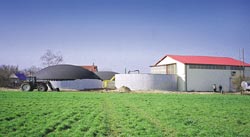Farm to fleets: running on biogas in Germany
 About 100 km east of Berlin in the state of Bradenburg, near Germany's border with Poland, is a German farm. It is different from thousands of other farms in Germany because it generates electricity using the complete rye plant and not just residues. The electricity is sold to a local power utility and a feed-in-tariff collected. The source of this electricity: a biogas plant. Farmer Martin Schulze and his wife Heike use the complete rye plant to fuel their biogas plant because the market price for rye had gone down and it was much more profitable to use it for biogas production. Schulze's plant is one of the first such farmer-owned projects in Germany, and he has become a regular speaker at renewable energy seminars.
About 100 km east of Berlin in the state of Bradenburg, near Germany's border with Poland, is a German farm. It is different from thousands of other farms in Germany because it generates electricity using the complete rye plant and not just residues. The electricity is sold to a local power utility and a feed-in-tariff collected. The source of this electricity: a biogas plant. Farmer Martin Schulze and his wife Heike use the complete rye plant to fuel their biogas plant because the market price for rye had gone down and it was much more profitable to use it for biogas production. Schulze's plant is one of the first such farmer-owned projects in Germany, and he has become a regular speaker at renewable energy seminars.
The plant did not come up without hurdles. "The chamber of agriculture's advice says that building a biogas plant costs Euro 600 (US $720) per metre cube. Had we followed that advice the plant would not have been possible,' says Schulze. The couple built the plant for just Euro 325 (US $390) /m3. Getting the approval for the plant took a lot of time. "Since this was the first plant in the region, authorities did not know how to deal with us,' says Schulze. The delay in approval cost the couple Euros 90,000 (US $1,08,000) in terms of lost revenues. Including this loss, the plant cost them Euros 6,50,000 (US $7,80,000). But even then the couple did not ask for subsidy and raised money through a bank loan. "Had we got into the process of getting grant or subsidy the plant would have been delayed even more,' says Schulze. The plant started operation in May 2003; gas was first produced in June-July and electricity generation began in July.
The plant has three digestors of 1,000 m3 each and two 250 kilowatt generators. Till now both generators have produced nearly one million kilowatt hours of electricity. They get a feed-in-tariff of 10 euro cent per kilowatt hour and can make a profit of Euros 56,000 (US $67,200) a year when running at full capacity.
Schulze put one interesting item while planning for the plant's cost: Insurance to fight legal cases. "Local power utilities often refuse to buy power from renewable energy producers like me by saying that they already have surplus power. We then have to hire a lawyer to fight the utilities and this can cost a lot,' says Schulze. But till now he hasn't needed a lawyer.
There are more than 200 biogas companies in Germany. "Biogas has huge potential in Germany. It can replace 20 per cent of the imported natural gas,' says Wolfgang Tentscher, head of, ECO Naturgas, a biogas company. "Biogas can be used to power 50 million vehicles in the country. Research has shown that biomass from just one hectare of land can run a vehicle for 60,000 km.
"The corresponding figure for bio-diesel is only 10,000 kilometres. If the entire potential for biogas is harnessed and all of it is used to power households, biogas alone can power 20 million out of a total 32 million households,' says Tentscher. But to realise the potential of replacing 20 per cent of natural gas from biomass by 2020, Germany needs to built 2,000 biogas plants a year.
"Currently we are constructing less than 200,' says Tentscher. Will it be enough for Germany?
